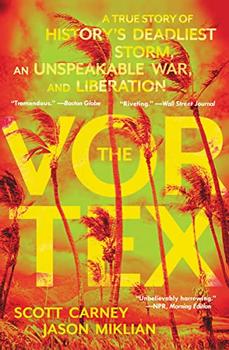Summary | Excerpt | Reviews | Beyond the Book | Readalikes | Genres & Themes | Author Bio

A True Story of History's Deadliest Storm, an Unspeakable War, and Liberation
by Scott Carney , Jason Miklian
A burly defender squared off against Hafiz's charge. Without breaking stride, he flicked a sharp cross into the box to his teammate, a striker from Islamabad, while he sprinted toward the goal. The ball arced high and true, over three Soviet midfielders and defenders. Then a strange thing happened. The moment the ball struck his teammate's chest, the crowd fell silent. If the Soviet players had a chance to catch their breath, they would have wondered what it meant.
In truth, Pakistan was a country divided, both geographically and culturally. A simple glance at the map showed how strange it was. Half the country lay to India's west. West Pakistan was the center of political and economic power and home to the capital city of Islamabad. The citizens of West Pakistan spoke mostly Urdu and Punjabi. The other wing, to India's east, had a much larger population but not nearly as much power. Here, in East Pakistan, people spoke Bengali.
West Pakistan and East Pakistan had been locked in a kind of cold war within the Cold War for the last twenty years. Tensions were so high that that no one in Dacca dared to cheer for a West Pakistan player, even one who played for the home team. A few goals from Hafiz's Punjabi teammates weren't going to get the fans to forget that West Pakistan treated East Pakistan like a colonial province.
Hafiz and the striker from Islamabad crisscrossed the ball on Dacca's only perfectly manicured patch of grass. The mood in the stadium alternated between somber moments of silence when the Punjabi had control to thunderous cheers every time Hafiz cradled the ball.
Hafiz didn't care for politics. He relied on his Punjabi teammates and considered them friends. Though sometimes he wondered if he only ran so hard because he wanted to hear the crowd cheer his name.
Seeing his opening, Hafiz dashed toward the goal, as the Punjabi player maneuvered the ball to take advantage of a gap in the defense. Three Soviets pressed down on the Punjabi, but he somehow threaded a miraculous pass through the defenders to Hafiz.
Now Hafiz was living every striker's dream scenario: one on one with the keeper, twenty yards out. Hafiz sprinted forward, eyes lasered in, not on the ball or the net but on the keeper's fidgeting fingers. Left or right?
Almost too easy, he thought.
Hafiz planted his left foot into the ground and fired with his right, just a fraction of a second ahead of two defenders sliding in for the tackle.
The Soviet keeper's gloved hands lunged to the right for a split second, as if by instinct. By the time he realized that the ball was sailing directly over him, he was too flat-footed to deflect it. The keeper's outstretched fingertips flickered in vain at the gently spinning ball, which snuck just under the crossbar and into the net.
"Goal!" an announcer shouted over the stadium's speakers. "Gooooaaaalll!"
Hafiz sprinted toward the Punjabi forward. They embraced, raising their hands together as the rest of the national team mobbed the strikers. Already high on their hometown star's performance, the crowd lost it. The Bengalis saluted their champion with full-throated roars. They started chanting Joi Bangla—Bengali words that translate to "Victory to Bengal"—in his honor.
Hafiz soaked in the adulation. As he looked out at the cheering throng, his very soul felt full. To them, he was a national hero. But that wasn't the only reason that Hafiz felt a particular sort of wistful exhilaration today. The crowd had no idea that he'd decided that this was the last professional match he'd ever play.
The teams went into the locker room tied at the half. No one expected a small developing nation to have a chance against a global superpower, but the entire Pakistani team tingled with nervous energy. There was an earthquake of an upset in the making. This could be the greatest moment of their careers.
Yet the Punjabi players on the team couldn't shake the sense that something seemed off.
Excerpted from The Vortex by Scott Carney and Jason Miklian. Copyright © 2022 by Scott Carney and Jason Miklian. Excerpted by permission of Ecco. All rights reserved. No part of this excerpt may be reproduced or reprinted without permission in writing from the publisher.
Censorship, like charity, should begin at home: but unlike charity, it should end there.
Click Here to find out who said this, as well as discovering other famous literary quotes!
Your guide toexceptional books
BookBrowse seeks out and recommends the best in contemporary fiction and nonfiction—books that not only engage and entertain but also deepen our understanding of ourselves and the world around us.